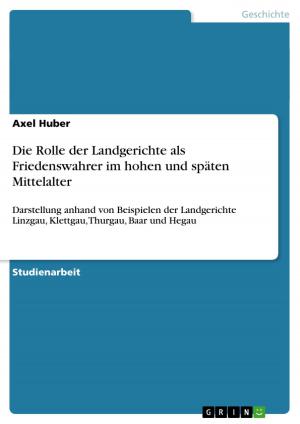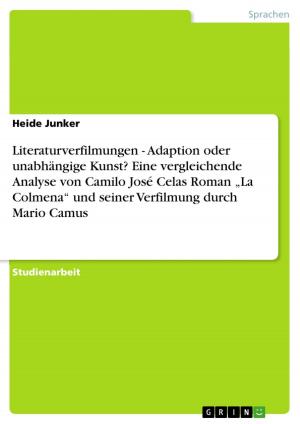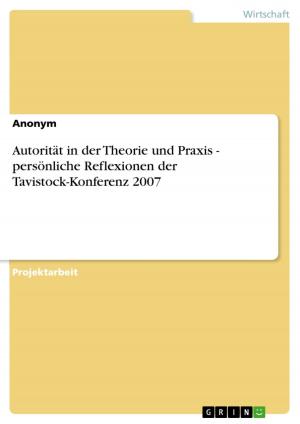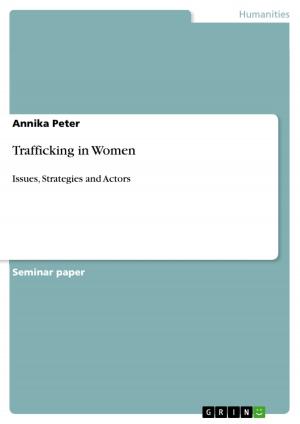Capitalism, Ethics and the Paradoxon of Self-exploitation
Business & Finance, Management & Leadership, Operations Research| Author: | Christian Bacher | ISBN: | 9783638475990 |
| Publisher: | GRIN Verlag | Publication: | March 6, 2006 |
| Imprint: | GRIN Verlag | Language: | English |
| Author: | Christian Bacher |
| ISBN: | 9783638475990 |
| Publisher: | GRIN Verlag |
| Publication: | March 6, 2006 |
| Imprint: | GRIN Verlag |
| Language: | English |
Essay from the year 2005 in the subject Business economics - Operations Research, grade: A+, University of Otago (Department of Management), course: Business Policy, 61 entries in the bibliography, language: English, abstract: 'The driving force of capitalism is the attainment of increasing rates of surplus value. This is inevitably exploitative and demeaning of the human condition. This makes an increased awareness of ethics in business practise untenable. Discuss.' The statement comprises of three arguments, or, more specifically, one argument and two consequences. They consist of the type argument 'if A then B' and 'if A and B then C'. In addition there is the request to 'discuss' in the statement. 'Discuss' could only apply to 'C'. In this case 'A' and 'B' would be taken for granted. I cannot easily accept this so I apply 'discuss' to 'A', 'B' and finally 'C' and approach each phrase separately. So I can reveal that 'if A and B then C' is only true under prior assumptions made about 'A' and 'B'. Chapter A deals with 'A', capitalism. Here I will provide a definition of capitalism containing its characteristics and effects and arrive at the answer as to whether 'increasing rates of surplus value' are the 'driving force of capitalism'. Chapter B shall examine whether capitalism 'is inevitably exploitative and demeaning to the human condition'. But before the terms 'exploitation', 'demeaning' and 'human condition' are discussed, they need to be defined. This chapter contains an analysis how 'capitalism' and 'humans' interact and interfere each other. Chapter C works on 'untenable (business) ethics'. Ethics, business ethics and their significance for 'humans' and 'capitalism' are presented. The focus here will be on the overlapping areas of 'ethics' with the contents of the other two chapters. The chapter concludes with conditions that fulfil the statement 'if A and B then C', with arguments discussed in light of the essay statement. But, actually, things are not that easy. The path of argumentation is relatively thin and unsatisfying. That is why the 'findings' section at the end of this essay questions the facts 'if A and B then C'. There are some underlying assumptions that this statement is built on. I will uncover some of these 'granted facts' and try to go one step back. The then broader but also deeper insight into the notions of 'rationality', 'bureaucracy' and 'ideology' also mark the turn to my self-reflective essay.
Essay from the year 2005 in the subject Business economics - Operations Research, grade: A+, University of Otago (Department of Management), course: Business Policy, 61 entries in the bibliography, language: English, abstract: 'The driving force of capitalism is the attainment of increasing rates of surplus value. This is inevitably exploitative and demeaning of the human condition. This makes an increased awareness of ethics in business practise untenable. Discuss.' The statement comprises of three arguments, or, more specifically, one argument and two consequences. They consist of the type argument 'if A then B' and 'if A and B then C'. In addition there is the request to 'discuss' in the statement. 'Discuss' could only apply to 'C'. In this case 'A' and 'B' would be taken for granted. I cannot easily accept this so I apply 'discuss' to 'A', 'B' and finally 'C' and approach each phrase separately. So I can reveal that 'if A and B then C' is only true under prior assumptions made about 'A' and 'B'. Chapter A deals with 'A', capitalism. Here I will provide a definition of capitalism containing its characteristics and effects and arrive at the answer as to whether 'increasing rates of surplus value' are the 'driving force of capitalism'. Chapter B shall examine whether capitalism 'is inevitably exploitative and demeaning to the human condition'. But before the terms 'exploitation', 'demeaning' and 'human condition' are discussed, they need to be defined. This chapter contains an analysis how 'capitalism' and 'humans' interact and interfere each other. Chapter C works on 'untenable (business) ethics'. Ethics, business ethics and their significance for 'humans' and 'capitalism' are presented. The focus here will be on the overlapping areas of 'ethics' with the contents of the other two chapters. The chapter concludes with conditions that fulfil the statement 'if A and B then C', with arguments discussed in light of the essay statement. But, actually, things are not that easy. The path of argumentation is relatively thin and unsatisfying. That is why the 'findings' section at the end of this essay questions the facts 'if A and B then C'. There are some underlying assumptions that this statement is built on. I will uncover some of these 'granted facts' and try to go one step back. The then broader but also deeper insight into the notions of 'rationality', 'bureaucracy' and 'ideology' also mark the turn to my self-reflective essay.















